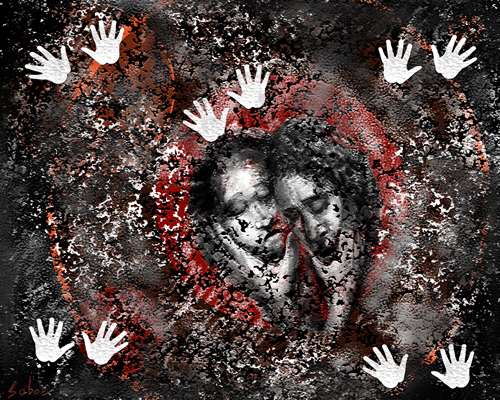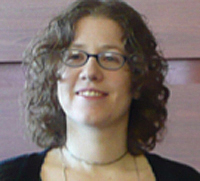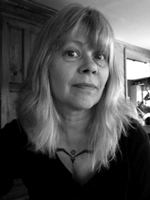How A Map Works
By Sarah Pinsker
Illustration by Linda Saboe

Seeing in the Dark by Linda Saboe
Nomi is four when she asks for the first time. Four or close to it. There is no real counting here. She’s old enough to ask, but perhaps not yet old enough to understand my answers. I’ve been expecting questions since the moment I gave birth, here in the darkness that is the only thing she’s ever known.
I have an answer to the question, “How did we come to be here?” That would be the easiest question to answer, and one I’ve been preparing for a long time. I have variations that depend on her age when she asks. Nuances. We were brought here. We were forced here, into the mountain.
She has heard us — the three adults in this cavern that is our prison — speak of before. She knows there are other places, places that are not here, though I wonder what she imagines when she thinks of them. I have answers if she asks where we came from, or what is outside the mountain.
Instead, she asks, “Will we always sort rocks?”
Her second question is a variation. “Did you always sort rocks?”
No child should be this sure of always, but she has never known anything else. She has always been in the dark. I believe she learned the word from one or another of us saying, “I feel like I have been here always.”
I’m careful never to say, “I will be with you always,” when she needs soothing. I don’t want to be caught in words I’m unable to enforce. I know her face, though I have never seen it. I’ve learned to dress her cuts and bruises, to wash her, to treat coughs and fevers, all in the dark. Her hair would be thick and curly if it had proper care, like mine once was. I pick through its tangles strand by strand. I don’t know the color of her eyes.
“Did you always sort rocks?” she asks.
“No,” I say. “I was a mapmaker.”
Her third question: “What’s a map?”

When I was perhaps a little older than Nomi is now, my parents brought me to the mapmaker’s hut. Her hut was the same size as ours, but inside it seemed smaller because of the large table at the room’s center. A goatskin, thinned and tanned to translucence, pulled tight on stretchers. Bowls of viscous liquid lined the wall. I clung to my mother’s leg.
The mapmaker — her name was Onda — crouched low to level her gaze with mine. Deep wrinkles in her face looked like clay turned too slowly. Her eyes were kind, and I didn’t flinch when she touched my arm.
“Have you ever seen a map?” she asked me.
I shook my head, and she pointed to the goatskin. “That mark there, that’s this hut. And that line — that’s the river. You see?”
I didn’t. The skin was covered with markings, but a mark is not a hut. A line is not a river.
“Leave her with me,” she told my mother. “I’ll bring her back to you later.”
I expected my mother to protest, but she kissed my head and left.
Onda unpinned the stretchers from one end of the goatskin and rolled it tightly to the other. She removed the stretcher from the other side, and tied the roll with a cloth scrap.
She led me from her hut and out of the village. We had all heard tales of children stolen away, but I didn’t feel stolen. My mother had given me away. I would be calm for now. We walked farther than I had ever been, and then left the path to scramble up a steep incline. Onda’s agility surprised me. She had moved slowly in the village, but out here she capered like a goat. Keeping up with her left me winded.
“Do you know where we are? Have you seen this place before? Speak.”
“The high place. We can see it from the village.”
“You’ve had no need to know words for such things before. No need to name them. This is a hill, like a dung heap but bigger. A hill is a small rise in the land. There are larger ones, far beyond here, called mountains.”
A small rise in the land. I pictured giant dung heaps and called them mountain.
“Places have names, like people. This is Hill Mor.”
“Hill Mor,” I repeated.
“Places are named by the first person to put them on a map. Mor was my teacher’s teacher’s teacher’s teacher.”
I dared to ask a question. “Is there a place named after you?”
“A fall of water, where the river breaks, far from here.” She looked over my head in the direction of the river for a long moment. When she turned back to me, she smiled for the first time. “Now I will show you how a map works.”
She unrolled it and held her hands out wide so the skin tautened, though her upper arms trembled somewhat.
“Look through it, Derona. What do you see?”
I examined the mark she had earlier claimed was the river, and the one she had claimed was her own hut, then looked through the translucent skin: the distant forests, the stone borders between crops and grazing lands, the path from the village, our own home. The images slid into place like a pattern emerging on a loom. I saw the map’s river for a river, and felt like a hawk, circling my home from above.
I pointed. “That’s your hut. And there, that’s ours.”
She asked me questions, then. Where she might put the sunset and sunrise, what else she might add to make the map more exact. I answered earnestly. When she had no more questions, she rolled the map up again and started down the hill without waiting for me. I followed. We walked back in silence.
“Are there more maps?” I asked. “Or just this one?”
“Oh, child. There have been many maps, and there are many more yet to be made.”
My mother leaned in our doorway. I think she had been watching us for a while. Onda nodded at me. “I can teach her. She has a good mind, good eyes.”
My mother smiled and picked me up, though I know I was getting too big to be carried. “Derona, my little mapwoman.”

These are the things my daughter knows: darkness, voices, rocks, songs. Unvarying meals served in stone bowls.
By my own measurements, by my own feet, our cavern is two hundred feet deep and thirty feet wide, though those numbers would hold no interest for Nomi. At the mouth there is a heavy door, which I do not allow her near, and at the door, a guard. A guard who watches through the heavy door, who somehow sees us even as they, too, stand in darkness.
I wonder what Nomi’s dreams look like.
I don’t know if her eyes would work if we ever left this place. How do eyes learn to see? Mine make out shapes and movement, sometimes, but little else. Mine haven’t forgotten, but hers have never known. She navigates the cavern more ably than we adults, trailing her fingers along the walls. She knows my voice from the others. She is at my side instantly if I call.
She knows our songs, the songs we sing while we work. Her voice is high and pure, and I sometimes wake to hear her singing to herself. Once I interrupt her as she sings the chorus to “My Goat He Wanders Far.”
“What are you singing?”
“My go tee wand ersvar,” she repeats.
“But what does that mean?”
She sighs, then explains to me in patient tones. “It doesn’t mean anything, Mama. Just sounds.”
I pick apart the words as I lie beside her on the pallet. How would I explain a goat? What is far? Far is when she strays from my side in the caverns. Then she returns to me with a perfect warm stone in her hands, and I kiss her head and say I missed her. I include the stone in my own basket at the end of the shift. She doesn’t yet have her own basket or quota, and I want to keep it that way as long as possible. When they ask, I will tell the guards she is too young, too simple, and pray she won’t hear and protest.

I apprenticed under Onda for ten years. I learned my letters first, then the particular dialects of land and map. The early lessons took place in her hut, or on Hill Mor, or in the meadows around our village. When we ventured to other villages, it was to meet their mapmakers, and those mapmakers’ apprentices, wide-eyed children like me. Some used inks that didn’t match ours, and some used variations of the symbols I had learned, but when we aligned our maps the stories blended and the differences faded away.

Nomi asks me, “What’s a map?”
I am working, sorting rocks, and I fail to consider my words. “It is a picture of a place.”
“What is a picture?”
I try again. “It is a story of a place.”
She likes stories.
We tell our children stories of the places we belong. Borean speaks of forests, Chima of the sea. These concepts are abstract to those who have never seen them. Borean has never seen Chima’s sea. Neither had seen a mountain before we were brought here. We tell the stories for the children and for ourselves.
We learned each other’s languages over time. Chima had a babe on hip when we arrived, Amer. Borean had two, Gan and Teg, though Teg is gone. I was the only one to give birth here in the darkness. Chima caught Nomi for me, and Borean held my hand. We are all these children know of the world. The games they have devised here are not the games children play.
“I think I hear my cousin,” Borean said once, early in our captivity, pressing her ear against the damp wall, though all I heard were the faintest murmurs. We thought there were others in other caverns like ours, but we had no way to tell who or where. Still, she pounded until her hand bled. “Aron! Can you hear me?”
There was no answer. Chima squeezed my hand, and we tried to pull Borean away before the guard could shout at her. He didn’t shout, but Teg was taken before our next meal. Borean wept into my shoulder at the far end of the prison, as Chima and I sang cheerful songs to muffle her crying. We learned the boundaries of our behavior.
I was the one to teach them the word and the concept “cavern,” though Borean had explored caves in her forest as a child. Those were shallow, with wide mouths, as she described them. This one narrows where it should open. At its tight-lipped mouth: the door, the guard.
The guards rarely speak to us, though we sometimes hear them speak to each other when they change places. They bring us meals, and take away our waste and our rocks. This is our world, the only world our children have ever known. The games they make up all involve rocks.

The first time I saw the mountains, I was fifteen.
“They don’t look anything like dung heaps,” I said. Onda laughed, and I smiled too, pleased at my own joke, and the memory of our first trip up Hill Mor. We had traveled widely by then, down the winding River Calumet and out to the sea, sometimes following her maps and sometimes charting new ones. I had even gotten to name a pond that had formed in a gully, when Onda consulted the maps and said she had not seen it labeled before.
“Lake Deroma.” I said.
“Pond Deroma.” Onda reached for her pack, to add to her own map. “Remember to check how it is fed, so your map will be accurate.”
The mountains violated my sense of scale. Only the sea had been similarly impressive, but my view of the sea was limited by the horizon; the mountains filled the sky like jagged teeth.
“What are they called?” I knew the names of four generations of mapmakers in seven villages, and expected her to cite one of them.
Onda shook her head. “The Mountains Ailish. The Ailish are their own people, with their own names for the individual peaks.”
“Why don’t we put their names for the peaks on our maps, then?”
“We don’t know them. They don’t trade with us. I’ve only once seen an Ailish map, and I couldn’t read their script. But they are there, and we must respect that.”

I saw the maps they brought when they came down from their mountains. Their maps had the same rivers as ours, the same hills and forests and lakes and plains. I couldn’t read the names they gave to places, only the symbols, so I didn’t know whether they used our names or their own. There were no symbols for our villages, as if they didn’t exist.

“Will we always sort rocks?” Nomi asks me.
“No,” I say.
“Did you always sort rocks?”

The march to the mountains was different from the time I had seen them with Onda. I still don’t know what happened to Onda, or to my parents. I didn’t see what happened to many people. I witnessed my new husband cut down before my eyes. His blood flowed in rivers between the hearthstones. It broke over the edge like a waterfall and formed a sea on the dirt floor. Even today I could trace its path.
I was a mapmaker. When they led us away from the village, I memorized the details of this new route, taking in as much as I could as the soldiers prodded us forward. When we camped they divided us and divided us again. I lost everyone I knew, but gained Chima and Borean and their infants. I measured the walks, memorized them for the return trip. Here, the pine forest’s edge. There, the dogleg where the road bends around a boulder. I didn’t know how long I would be gone.

“Did you always sort rocks?” She hands me two, both warm and shapely. Good rocks by the standard we have learned, though we don’t know what they are used for. They clack against each other as I add them to my basket.
“No. I was a mapmaker.”
“What’s a map?”
I reach out and trace her face, its contours and planes. It has lost some baby roundness.
I glance in the guard’s direction, as if a glance could tell me something. Even after all these years here, it’s not easy to guess what will upset them. We know what we are supposed to do, but it is a narrow path to navigate and easy to step off.
“Sit down,” I say. She complies.
I reach into my basket and remove a handful of stones. She puts her hand on mine. I spend a moment arranging them on the ground.
“What are we doing?” she asks. I love the “we.”
“We’re making a map.”
When I’m done — when we’re done — I let her explore. “Pretend these rocks aren’t rocks,” I whisper. “Don’t move them. Feel where they are in relation to each other.”
“Tell me again what the other things are.”
I tell her of grass and goats, of swift rivers and lazy ones. I pour water from jug to a bowl, first in a rush, then in a trickle, so she can hear the difference. I butt her chest and lip her fingers like a goat and make her giggle. I explain distance within the cave’s confines. I place her hand on my heart for near. I send her to the far end of the cavern for far, then call her back to me.
I put her hand on the largest piles and call them mountains. I call them “here” and “near,” but never “home.” We explore the other piles. Rocks for hills, rocks for the sea, rocks for the tall pine forests. The smallest rock for a small village, far away.
I’ve never explained “home,” but now I do. The smallest rock. “This is home,” I say. We go over the map, again and again, until she understands the symbols, if not what they stand for. Nomi is four, and she has only just begun to ask questions. I try to imagine answers while I gather more stones, but my head fills with maps. Someday the door will open and we will step outside. We’ll make our way home by the maps in my head. She’ll recognize the warmth of sunlight, even though she has never seen it.
 Unlikely Story
Unlikely Story



